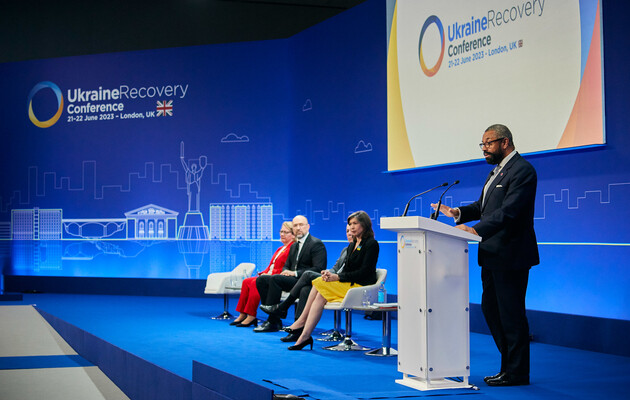Three Key Conclusions About the Reconstruction of Ukraine from the Conference in London

The largest event for the reconstruction of Ukraine URC-2023 took place in London. Europeans have already called it another form of counteroffensive, referring to strengthening the economy and strategic planning for further support.
Moreover, during the conference, a number of countries announced additional help with weapons: Latvia will supply helicopters, Germany promised to provide missiles for Patriot and special equipment, Estonia and Iceland will provide us with a field hospital, equipment for paramedics and counter-UAS technologies.
However, the key takeaway from London is that billions of dollars and euros in aid will come at the cost of serious anti-corruption measures. In order to receive money from international partners for reconstruction, efforts must be made in reforms.
In order for Kyiv not to take “one step forward – two steps back,” on the eve of the G7 conference in London, they made a statement with clear deadlines. By September 30, Ukraine must restore declarations and public access to the register of declarations, reporting of political parties, as well as strengthen the capacity of National Anti-Corruption Bureau of Ukraine and Specialized Anti-Corruption Prosecutor’s Office.
Despite the friendly and favorable tone of the speeches, international partners, including business, allude to strengthening the fight against corruption and speeding up reforms. The emphasis is on the judicial one.
While the outcome of the conference in Lugano was a shocking for many 750-billion-dollar reconstruction plan and a declaration with basic principles; after the URC in Berlin Ukraine received 18 billion euros of support for 2023 – distinctively the conference in London became one of the most successful in terms of not only financial guarantees, but also strategic recovery.
Let’s analyze the key results of London, which also constitute challenges for Ukraine.
Number One. 60 Billion Euros
Ukraine’s needs by 2027 will amount to EUR 110 billion. Covering most of them, EUR 60 billion, is the result of the conference in London. These are grants, loans, and frozen Russian assets.
In particular, the EU will provide Ukraine with EUR 50 billion over the next four years.
Announcing this amount, the president of the European Commission, Ursula von der Leyen, emphasized that Ukraine will become a member of the EU, and “Ukrainian reforms will receive European investments.” “For every step you take towards us, the European Union must take a step towards Ukraine. You need to ensure transparency,” she noted, naming two key conditions: reforms and implementation of the European Commission’s recommendations.
Fifty billion will come through a special financing instrument the Ukraine Facility. It will have a European audit and control system, and a special independent Audit Commission will check the use of funds.
Ukraine Facility resources will be directed to financial stability, reconstruction and modernization of infrastructure, creation of a favorable investment environment. It is important that one of the goals of the instrument is to strengthen the rule of law and the fight against fraud and corruption, as well as promoting the development of an independent judiciary.
Thus, the Ukrainian government will be able to receive EU funds for the reconstruction and support of the economy, provided that this happens in parallel with anti-corruption measures.
In addition to EU support, the US will allocate USD 1.3 billion to Ukraine for energy and infrastructure needs, USD 3 billion will come in a package of economic aid from the UK, while another batch of more than USD 6 billion will be provided as a support from a number of other countries and international financial institutions.
On the margins of the London Conference, during the discussion of sums, it was repeatedly said that it was necessary to “put an end to nepotism and corruption.”
Number Two. Reconstruction Control System
“The dream of Ukrainians is also our dream,” said Ursula von der Leyen during her speech. Symbolically, on the same day, Ukraine presented the public module of the DREAM reconstruction management ecosystem, which works according to the “everyone sees everything” principle.
DREAM will allow monitoring every stage of the implementation of reconstruction projects: from the amount of funds involved and tenders to their completion. Simply put, every British or American can see exactly which objects their countries finance and what exactly the funds are spent on.
The data is presented in the form of graphs, tables, and diagrams, you can view information by communities or regions. Moreover, internationals themselves can choose projects for financing and monitor their implementation. This is important for the empowerment of communities and their direct inclusion in reconstruction processes.
More than 6,000 projects have already been entered into the system. The system will be fully functional in 2024.
Since the West constantly emphasizes the principles of transparency and accountability during the use of reconstruction funds, the electronic system can significantly strengthen Ukraine here.
However, the issue of transparency in the allocation of funds remains important. After all, the activities of commissions and funds are not always public, Ukrainians can find out about most of the expenses already by the fact of making decisions.
Number Three (with reservations). Anti-corruption progress
The European Commission provided a verbal preliminary assessment of Ukraine’s implementation of the recommendations on the way to EU membership, noting “significant steps forward” and progress in the implementation of reforms.
However, this result is with reservations, because currently Ukraine has been credited with fulfilling two of the seven recommendations. These are the conditions for the reform of the judiciary and mass media.
Reforming the Constitutional Court of Ukraine is marked as “good progress.”
There is “some progress” in the fight against de-oligarchization, the adoption of a law on the rights of national minorities, as well as in the fight against corruption, money laundering and law enforcement reform, where “it is necessary to strengthen the anti-money laundering system.” I would like to remind you that the State Anti-corruption Program for 2023 envisages a competition for the head of the National Police as the first step towards police reform. Also, the European Commission, after a year of full-scale war with a number of corruption scandals and dismissals among top officials, emphasizes that the fight against corruption is “at a high level.”
A number of signed agreements and memoranda, the creation of a business coalition for reconstruction of more than 400 international companies, and a serious step to insure military and political risks can be added to the results of London.
However, the three above-mentioned results are key to the simultaneous implementation of reforms, combating corruption, and building trust in Ukraine on the part of international partners.
After all, it is corruption that can slow down reconstruction and the attraction of public funds and private investments. The public continues to advocate for accountability tools, open registries, and transparent procurement.
Therefore, one of the priorities of the Ukrainian government, even during the war, is the fight against corruption and anti-corruption reforms. And this fundamentally distinguishes us from Russia.
Please select it with the mouse and press Ctrl+Enter or Submit a bug











 Login with Google
Login with Google